ARTICLE AT-A-GLANCE
Ready to make a habit out of healthy eating? Just one month of consuming whole, unprocessed foods benefits your health in a number of ways. Although following a clean diet can be difficult at first, the rewards will be worth it. Prepare for your clean eating journey with this guide:
Long-Term Results with Clean Eating
For a plan you can actually stick to, you need to stay away from fad diets and start a clean eating plan instead.
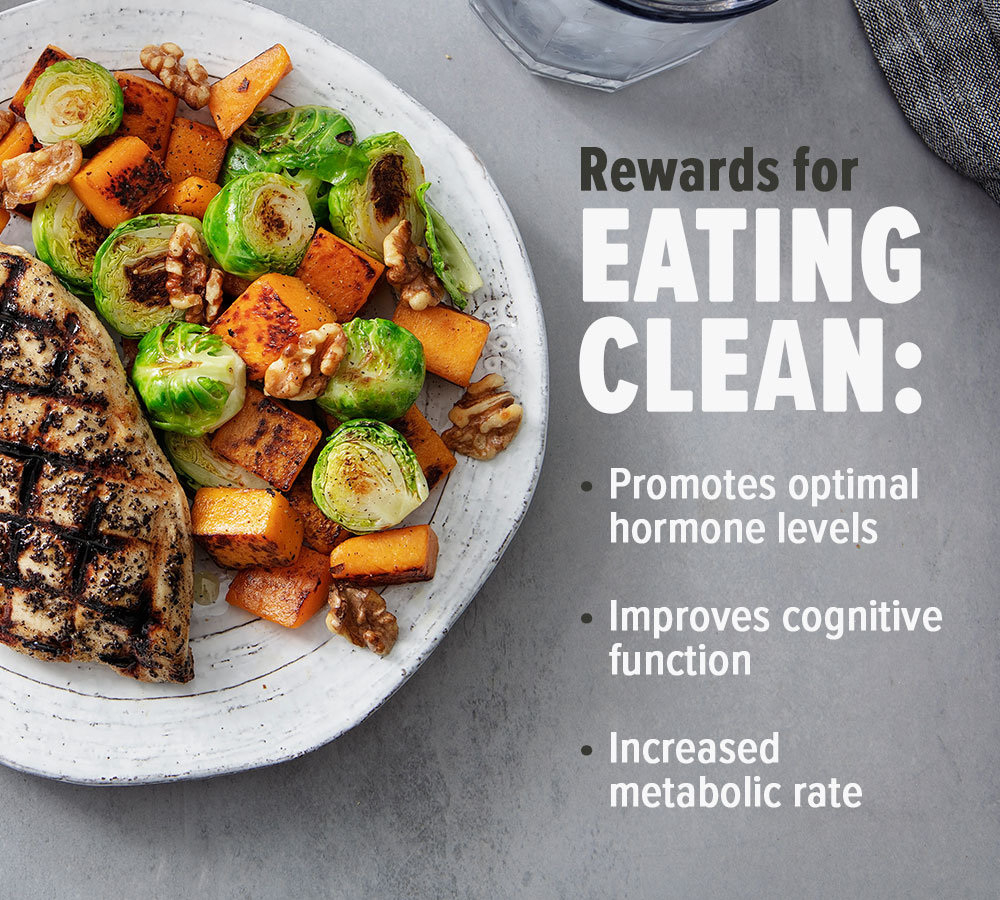
The exact details might vary from person to person based on individual nutritional needs, but in general, clean eating includes the following:
- Foods that are not genetically modified or heavily sprayed with chemicals and without additives, preservatives, dyes, or other artificial elements
- Protein from animals raised on their natural diets, not confined to commercial feedlots
- Fats and oils that aren’t hydrogenated and don’t contain excessive amounts of omega-6 fats
- A balance of omega-3, omega-6, and omega-9 fats from sources such as extra virgin olive oil, avocados, nuts, seeds, grass-fed proteins, and wild-caught fish
- 25 to 35 grams of saturated fat per day; 25 grams of fiber per day
- A variety of non-starchy, colorful vegetables and fruits that are low in fructose and provide valuable phytonutrients, micronutrients, enzymes, and prebiotics
- Gluten-free carbs — rice, quinoa, oats, yams, buckwheat, amaranth, or cassava — as needed
- Minimal processed and high-sugar foods
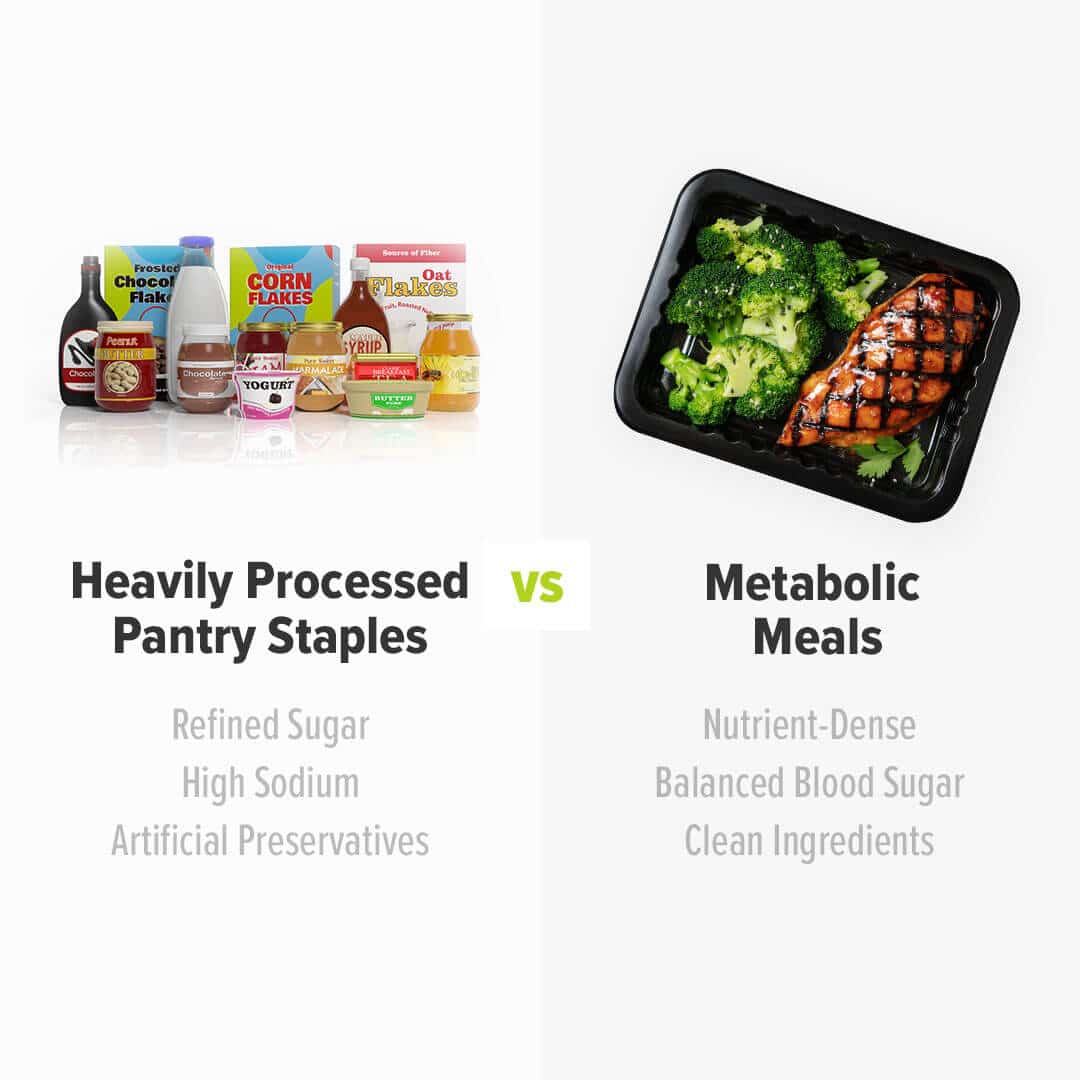
Sounds great, right? It should: The perks of eating clean include improved cognitive function, increased energy, decreased digestive symptoms, and more. But to see benefits like those, you have to stick to a clean eating program for more than just a week or two. And that can be difficult, as the first week of a new diet is often the hardest to endure.
Fortunately, you don’t have to go in blind. Prepare for your clean eating journey with this guide to what will likely happen to your body each week during a month of clean eating.
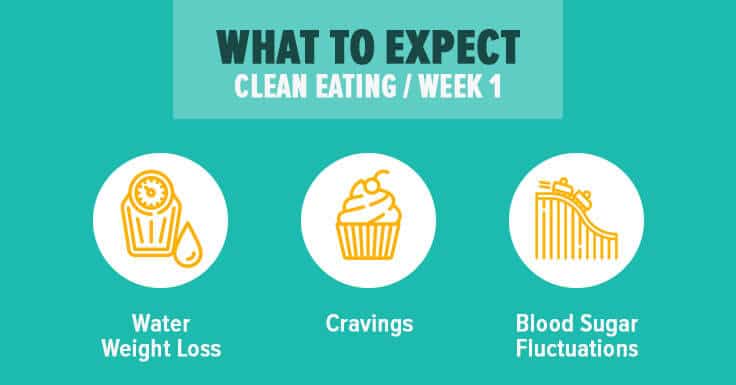
Blood Sugar Fluctuations: Blood sugar will vary between highs and lows if you’ve been eating unhealthily for extended periods. Unhealthy eating causes high circulating insulin levels, and because you will be consuming a drastically reduced amount of sugar, you’ll likely see fluctuating blood sugar levels.
Cravings: Cravings could be strong as a result of that blood sugar fluctuation.
Sleep: Blood sugar fluctuation could also cause poor sleep quality, especially if you find yourself waking up between 1 and 3 a.m.
Water Weight Loss: Much of the initial weight loss during week 1 will actually be water, which you lose as you eliminate common food sensitivities from your diet and your level of inflammation is reduced.
Natural Detox: You will begin a natural detoxification process as you consume more amino acids, micronutrients, and fiber; some people actually feel worse during the first week of clean eating because of this detox process.
Mental Clarity: Toward the end of Week 1, you might start noticing less “brain fog” and more mental clarity.
Fat Loss: Fat loss will begin due to a reduction of calories, but again, most initial weight loss is water weight.
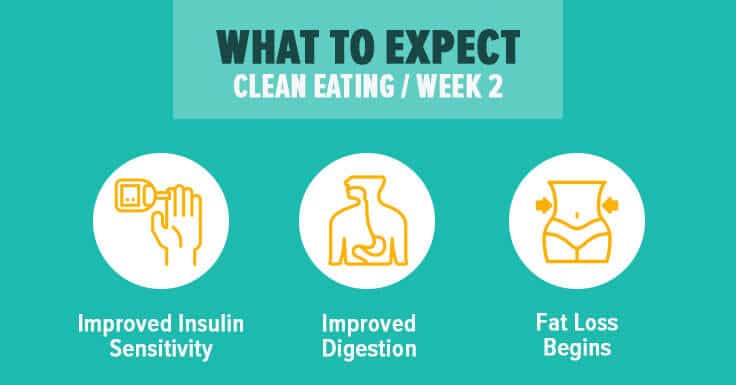
Cravings: Cravings will still be likely.
Blood Sugar & Insulin: Blood sugar will begin to stabilize but might still be erratic at times. Insulin sensitivity will likely start to improve as you consume less sugar and more valuable micronutrients, enabling your body to turn specific body processes on and off.
Digestion: You might notice improvements in reflux or other digestive symptoms.
Energy: Your energy levels should become noticeably higher than in Week 1.
Detox: Detoxification will continue, but you should begin to feel a better sense of well-being.
Fat Loss: Water weight loss will begin to level off, and fat loss will become more pronounced.
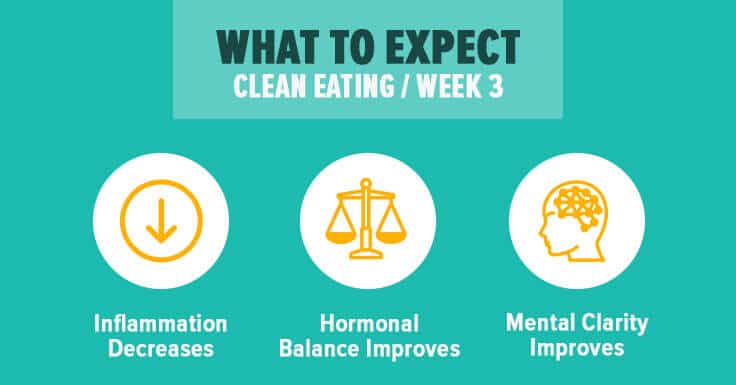
Blood Sugar Improvements: Blood sugar will continue to improve and likely won’t increase or decrease excessively unless you consume a meal high in sugar.
Health Improvements: Inflammatory markers will continue to decrease. Hormonal balance will improve as insulin sensitivity increases. Metabolic rate will likely improve.
Fat Loss: Water weight loss will decrease even more, and fat loss will increase and become more noticeable.
Cravings: Cravings will drastically reduce.
Mental Clarity: Mental clarity, motivation, and drive will noticeably improve around Day 21. Your sense of well-being will continue to increase.
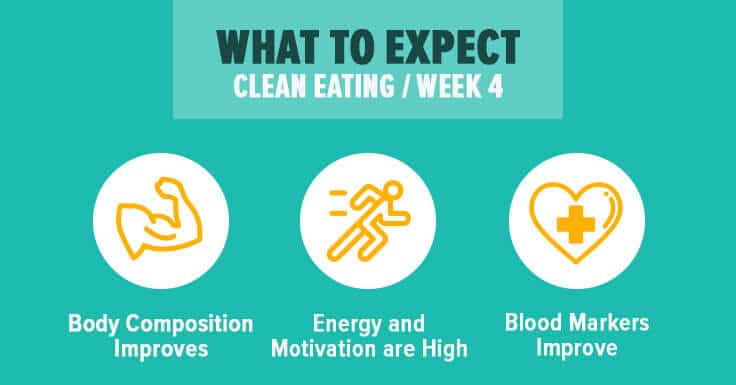
Fat Loss & Muscle Mass: Body composition improvements will begin to become even more visible with an increase in fat loss, metabolic rate, muscle mass, and tone.
Mindset: Energy and motivation will likely be at their highest points since the starting point.
Hormones and Cognition: Cognitive function, along with hormonal balance, will continue to improve.
Health Improvements: Blood pressure and blood markers (glucose, VLDL particles, triglycerides, and c-reactive proteins) will likely be improved from the starting point.
Digestion: Complete relief from symptoms of poor digestion is possible.
Cheat Meals and Long-Term Success: You will likely be able to handle a cheat meal every five to seven days without extended bouts of high blood sugar. After 30 days of clean eating, you’ll have a much greater chance of complying with any future diet you choose.
How to Prepare for Your Clean Eating Diet

Four weeks of clean eating is no small hurdle to overcome. Aside from sticking out the first week, there are some additional struggles to be aware of when you start your clean eating journey. You need to plan to avoid the following three mistakes:
1. Lack of consistency
Fad diets are popular for a reason. Many people look for the next big thing and mentally prepare themselves for three to seven days of discomfort in exchange for a quick result. But any results they see are unhealthy and unsustainable, and they don’t promote the habit development necessary for long-term health results.
2. Lack of knowledge
People often choose to listen to only the advice that fits their narrative. If you love carbohydrates, you might be more inclined to listen to a self-proclaimed guru who promises results no matter the type or quantity of carbs you eat. In this case, you’d be overeating the macronutrient that most likely caused your weight gain in the first place. When it comes to nutrition, usually the path you don’t want to take is actually the one you should start walking down. After a few weeks, it will get much easier.
3. Lack of planning
In my experience, if people have easy access to healthy food, they’ll usually eat it. People are more strapped for time than ever before, and the likelihood that people will make decisions based on what’s fast rather than what’s right seems to be at an all-time high.
Making Your Clean Eating Diet Last

To combat these struggles, you need to find a solid clean eating plan that’s actually healthy, and it must be something you can stick with. For instance, the ketogenic diet has worked quite well for thousands of people, but if you can never see yourself consuming 70 percent of your calories from fat, then other people’s success doesn’t matter.
Luckily, clean eating doesn’t have to be a one-size-fits-all approach, and you do have options. Whether you do some experimenting or find a legitimate nutritional expert or company to help you formulate a plan, solving this problem will be one of the most important things you ever do for yourself.
Once you feel confident that you’re on the right path, it’s time to figure out how to consistently follow it. You have three main options to make sure you’re ready.
First, you can commit to preparing all of your meals ahead of time with the proper ingredients and in the correct quantities.
Second, you can use a healthy meal delivery service to ensure you have everything you need, without having to do all the work yourself.
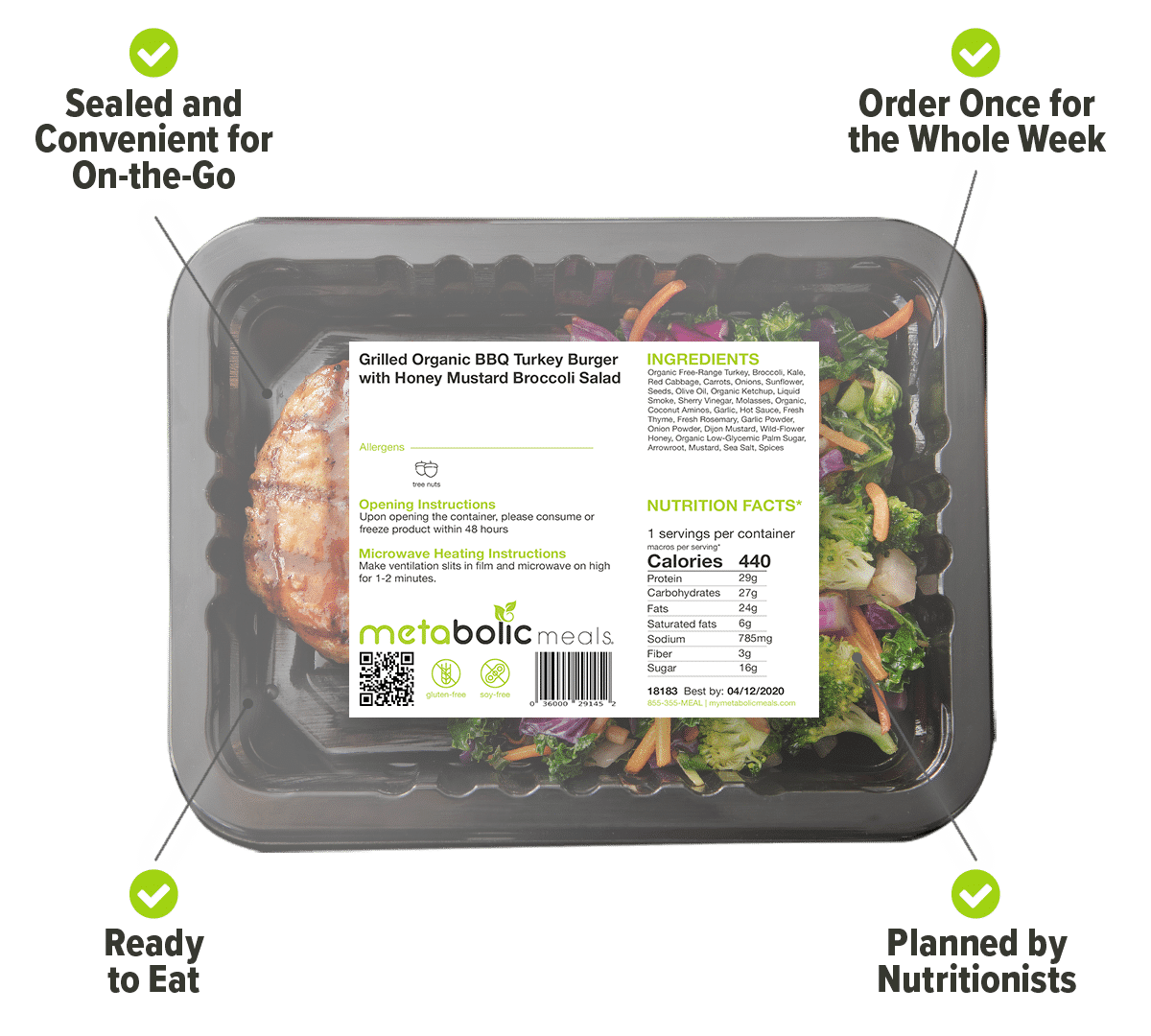
Veering too far outside those options will definitely decrease the likelihood that you’ll stay on track during your clean eating journey. But as long as you know what you’re in for, prepare to face challenges, and plan to overcome them, you’ll be on your way to a healthier lifestyle for the long term.






